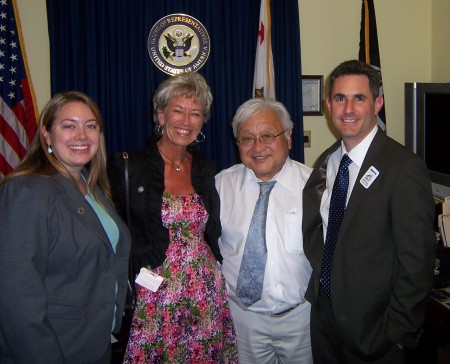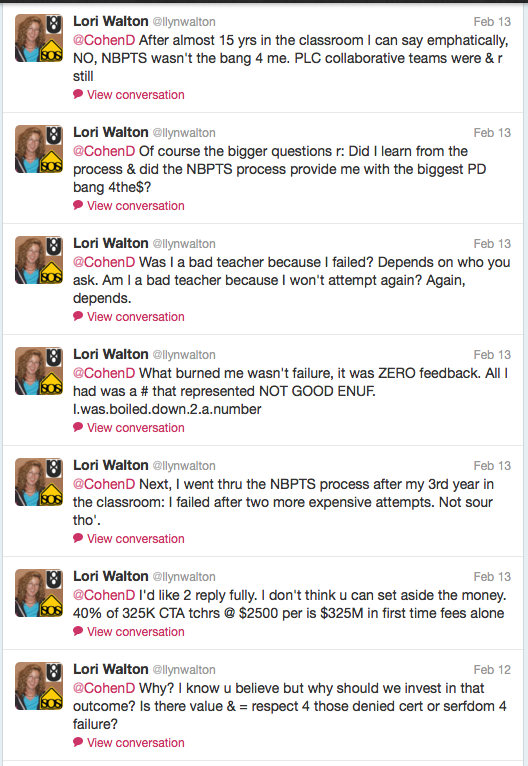Answering Questions About National Board Certification
For a couple weeks now I’ve been meaning to write something to Lori Walton, but of course, in this venue, it’s really for anyone interested in National Board Certification for teachers. Lori raised some important questions and concerns in an exchange that took place on Twitter, but feeling the constraints of that format, I opted to write a longer response here.
Let me put some important information and disclaimers up front. I’m a National Board Certified Teacher (Adolescent/Young Adult English Language Arts, 2004), and even before I attempted certification, I had a favorable view of the National Board for Professional Teaching Standards and the certification process I intended to undergo. After certifying, I spent two years as a candidate support provider at Stanford’s National Board Resource Center, which is the organization that gave birth to Accomplished California Teachers.

NBCTs Ashley Alcala, Leslee Milch, and David B. Cohen, with Congressman Mike Honda (CA-15), 7/28/11.
I’ve attended three NBPTS national conferences and a policy leadership forum, with three of those events including visits to Capitol Hill to lobby Congress on behalf of the organization. I have friends among the present and former directors on the NBPTS Board of Directors, and currently employed by NBPTS. So, yes, I’m biased. I come to the discussion believing in the value in the organization, the process, and the certification. At the same time, I believe that any healthy organization – like a family, classroom, or school – should be open to constructive criticism and a respectful airing of concerns. It is in that spirit that I welcome a dialogue with Lori Walton; I do not in any way speak for NBPTS.
Now, the trigger for the conversation on Twitter was my tweet from an event celebrating the 2013 California Teachers of the Year. Two of this year’s five honorees, Veronica Marquez and I’Asha Warfield, are National Board Certified Teachers (NBCT). I tweeted that fact, and said I’d look foward to the day when two out of every five California teachers are NBCTs. That’s a long way off. Currently, about 3% of American teachers are NBCTs, and in California, it’s an even lower percentage. Many states have a much higher percentage of NBCTs; Washington and North Carolina each has more NBCTs than California.
Lori Walton saw that tweet, and started a lengthy series of tweets containing questions and issues that often come up regarding National Board Certification. I replied to a few of her tweets, but here, I’m reproducing only her portion of the exchange, in two parts. Note: the sequence is shown in reverse order, last tweet on top, first on the bottom.
The cost of certification has always been a significant issue. States and districts that value certification have found ways to defray the costs for the teachers. And importantly, beginning this spring, NBPTS is switching to all-electronic submissions via ePortfolio. From what I’ve heard, this change will dramatically lower the cost of candidacy.
Regarding the lack of feedback, that is a common concern. I would distinguish this from a typical learning activity in which the learner is supposed to be guided and coached by an instructor. In that situation, feedback is non-negotiable. In this situation, going for a professional certification, I think we have something closer to a bar exam or a board exam in another profession; as far as I know, there’s no feedback in those assessments, either. Providing feedback would no doubt add to the cost of what is already an expensive process, though it may improve in the new electronic era for NBPTS. Also worth noting, the certification has ten elements to it: four portfolio pieces, and six assessments completed in a testing center. The score report from NBPTS does include scores for each of the ten elements, allowing candidates to focus on weaker scores if they choose to continue the process.
In my experience as a candidate, and as a support provider, I did not develop the opinion that certification was automatically an indication of outstanding teaching, or that failure to certify should be considered a mark of a poor teacher. There are some false positives, teachers who may not excel in the estimation of their peers, but are successful in the certification process. Likewise, I know there are some fine teachers who go through the process without certifying. It’s a challenging and complex process that pushes us to provide concrete evidence that aligns with a significant number of richly articulated teaching standards. In my own certification, the lowest scoring portfolio entry was a video-based entry that showed a lesson I think is highly effective. When I saw the score and looked back at the entry with a critical eye, I saw gaps in the evidence, standards that I had not fully addressed. I still use that lesson every year (with some fine tuning as needed), and I’m sure it serves students well. I wasn’t able to show everything I needed to show in the video, student work, and tightly limited writing that I submitted.
Regarding certification as professional development, I’m not surprised that Lori finds professional learning communities and collaboration to be more meaningful in her work. In the years that I’ve been following NBPTS, I’ve seen firsthand and heard from many people who know through their own experience that working on certification with a cohort of peers in a support program or in the same school or district can make the process much more beneficial. I know that’s not what Lori meant, but I’m agreeing that our professional learning is strongest when its interactive. It must also be intentional, substantive, and sustained. So, while Lori prefers PLCs to working on NB certification, I’d suggest that combining them would be even more powerful. That approach has become much more of a focus on the National Board, more recently than Lori’s experience as a candidate. It’s an idea whose value is illustrated in the documentary Mitchell 20, which provides an honest look at the challenges, and partial success of 20 teachers from Mitchell Elementary School (AZ), who worked towards certification at the same time.
Lori Walton’s tweets continued, as will this response, in another blog post coming soon.
For a comprehensive review of National Board Certification – written by National Board Certified Teachers – I recommend Measuring What Matters, a Teacher Solutions report from the Center for Teaching Quality.
NBPTS also provides information about research demonstrating the value and efficacy of certification.
This blog post has been shared by permission from the author.
Readers wishing to comment on the content are encouraged to do so via the link to the original post.
Find the original post here:
The views expressed by the blogger are not necessarily those of NEPC.

